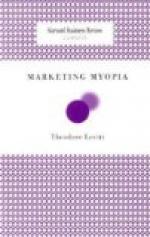“Then,” quoth Ingcel, “I said, gazing at him:
I see a high, stately prince, etc.
I see a famous king, etc.
I see his white prince’s diadem, etc.
I see his two blue-bright cheeks, etc.
I see his high wheel ... round
his head ... which is over his
yellow-curly hair.
I see his mantle red, many-coloured, etc.
I see therein a huge brooch of gold, etc.
I see his beautiful linen frock ... from ankle to kneecaps.
I see his sword golden-hilted,
inlaid, its in scabbard of
white silver, etc.
I see his shield bright, chalky, etc.
A tower of inlaid gold,” etc.
Now the tender warrior was asleep, with his feet in the lap of one of the two men and his head in the lap of the other. Then he awoke out of his sleep, and arose, and chanted this lay:
“The howl of Ossar (Conaire’s dog) ... cry of warriors on the summit of Tol Geisse; a cold wind over edges perilous: a night to destroy a king is this night.”
He slept again, and awoke thereout, and sang this rhetoric:
“The howl of Ossar ... a battle he announced: enslavement of a people: sack of the Hostel: mournful are the champions: men wounded: wind of terror: hurling of javelins: trouble of unfair fight: wreck of houses: Tara waste: a foreign heritage: like is lamenting Conaire: destruction of corn: feast of arms: cry of screams: destruction of Erin’s king: chariots a-tottering: oppression of the king of Tara: lamentations will overcome laughter: Ossar’s howl.”
He said the third time:
“Trouble hath been shewn to me: a multitude of elves: a host supine; foes’ prostration: a conflict of men on the Dodder[8]: oppression of Tara’s king: in youth he was destroyed; lamentations will overcome laughter: Ossar’s howl.”
[Footnote 8: A small river near Dublin, which is said to have passed through the Bruden.—W.S.]
“Liken thou, O Fer rogain, him who has sung that lay.”




